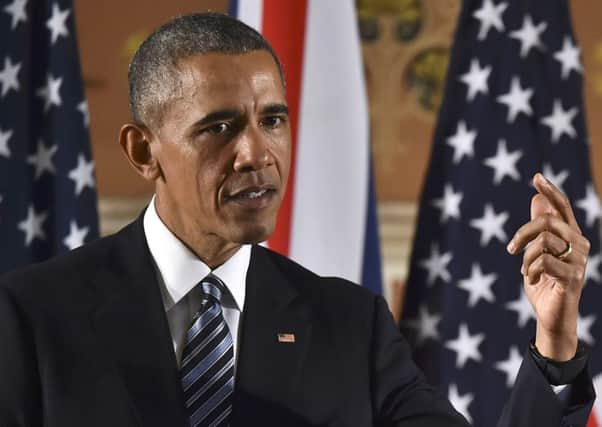Leaders: Obama's intervention was born out of genuine belief


So did Barack Obama urge the UK to stay in the EU as a friend, keen to step in and save us from a wrong choice as a friend should, or is he simply a foreign politician looking out for his own country’s best interests and interfering where he shouldn’t? The answer is it does not matter. The fact is that he has intervened because he felt he had to.
Just by looking at the extraordinary language he uses it is obvious Mr Obama feels very strongly in his views. To reinforce his feelings he uses very emotional imagery, that of the tens of thousands of American service personnel lying in their European war graves, he says the EU rose “from the ashes of war” and he talks about the US special relationship with Britain being forged “as we spilled blood together on the battlefield”.
Advertisement
Hide AdAdvertisement
Hide AdIts not too much of a stretch to hear that the president is saying America is owed a debt, one it paid for with the blood of its citizens, and that to honour that Britain should stay in Europe. It is strong stuff. Not the usual sort of language we expect in international diplomacy. We should understand that it reflects the president’s view of the magnitude of the decision before us and the potential consequences should Britain decide on leaving the EU.
If he feels as strongly as he obviously does he has no choice but to say what he thinks, either as a friend or simply as a powerful observer.
It is hard to say what effect Mr Obama’s appeal will have on the ordinary British voter. There will one school of thought that says such a blatant intervention might backfire, with British citizens not very happy with being told what to think by an outsider.
But the reaction of London Mayor Boris Johnston and Ukip leader Nigel Farage to Mr Obama’s intervention is nothing short of shameful.
Citing a nine-year old story about the removal of a Winston Churchill bust from the Oval office, a story which has been described as “100 per cent false” by American officials, Mr Johnston says the removal was attributed by some to “the part-Kenyan president’s ancestral dislike of the British Empire”.
Mr Farage said he thought Mr Obama “bears a bit of a grudge” against the UK.
Those comments are deeply offensive and show just how desperate both men are and how low they are prepared to sink in order to stifle real debate about the issues and score any kind of cheap points they can.
But they are very deliberate comments. They both know that that kind of casual racism will appeal to a small number of wrong-thinking individuals when it comes to the issue of immigration, and that it talks in a very insidious way to the image of British sovereignty, which is wrapped up in past glories that were the very opposite of glorious.
Advertisement
Hide AdAdvertisement
Hide AdBut if President Obama’s intervention might spark some sort of backlash against what he was trying to achieve, it is to be hoped that the pernicious response of two leading lights in the Brexit campaign will let people see exactly what they are, and want to have nothing to do with them.
Tolerance must not blind us
For a country that aims to be a home for all creeds and colours, it is disturbing to hear that such an aspiration could pose a threat to our security.
An academic has warned that Scotland’s “extreme tolerance” of other faiths and cultures carries the risk of failing to spot the threat of radicalisation. The theory is that accepting others who hold different beliefs will allow dangerous factions to take root in Scotland, and grow unchecked.
Respects for others, and making welcome those from different cultures, is a matter of pride. Scotland’s generosity on this front is overstated at times, but the positive response to the migrant crisis this year, in particular the public’s willingness to take a share of those seeking homes, suggests a reputation for toleration holds some justification.
That said, most of us would like to think that our toleration is conditional, and that we would identify and report anything of concern in our midst. But that will not always be enough. We cannot ignore the evidence that problems exist, and last month the murder of Glasgow shopkeeper Asad Shah highlighted sectarian tensions in the Muslim community, while last year it emerged that a man who grew up in Aberdeen had become an Islamic State terrorist in Syria. Who of those who knew this man could have predicted this path?
There is a delicate balance to achieve here, between a live-and-let-live approach and a climate of default suspicion. Scotland has been praised for its community cohesion and inclusive attitude, but heightened security concerns mean that, increasingly, we must be wary of our tolerance amounting to turning a blind eye.